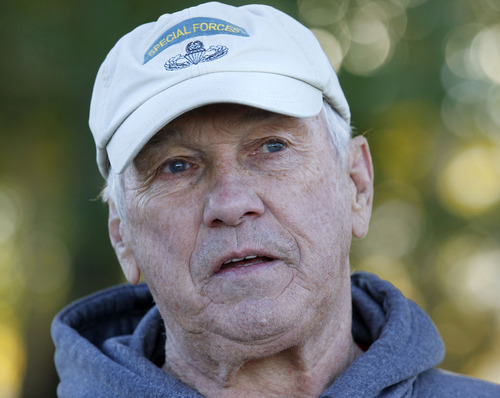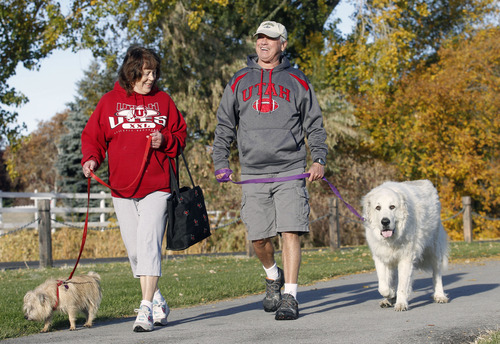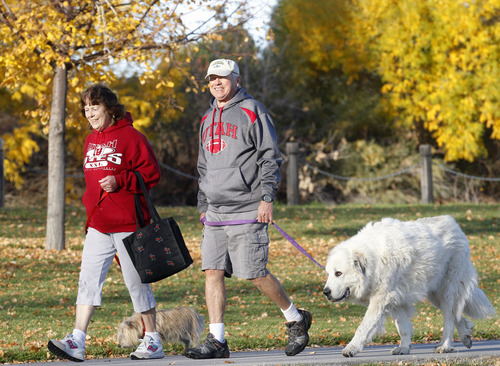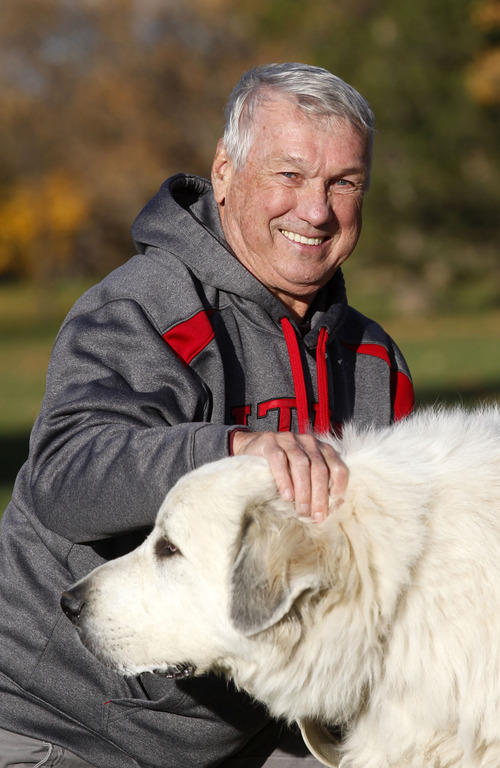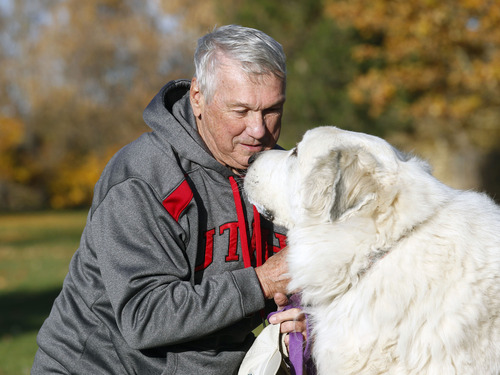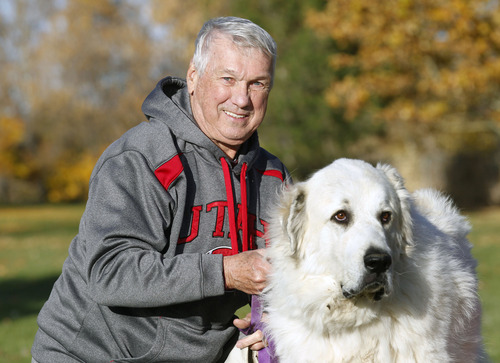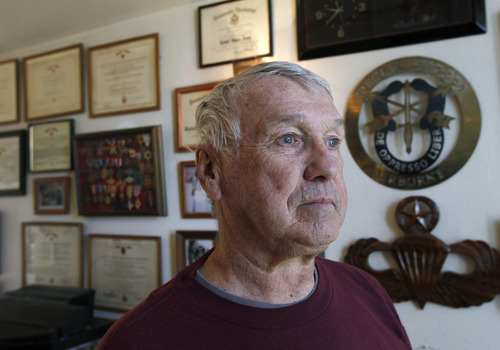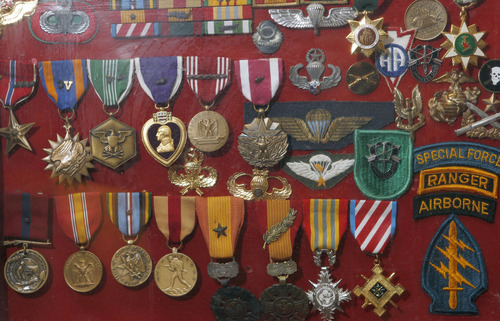This is an archived article that was published on sltrib.com in 2012, and information in the article may be outdated. It is provided only for personal research purposes and may not be reprinted.
Patrick Watkins saw his share of insider attacks in Vietnam. It sickens him to read about Afghan security forces turning against American and coalition forces; more than 60 have died at the hands of supposed colleagues this year.
The decorated Taylorsville veteran, co-grand marshal of Sunday's Veterans Day Parade, has been recommended for the Army's second-highest medal for valor in connection with such an attack, one that killed 18 of his fellow special operations forces in 1968.
Betrayal by insiders is just one of the parallels he sees between his war and the one in Afghanistan, and it leaves him cold.
"You can't win as an occupier. You can have all the best intentions in the world, but if it drags on, pretty soon everybody starts hating you. People you train hate you. The bad guys hate you," says Watkins, 74. "It's a no-win situation."
Watkins spent 27 months in country — three combat tours in Vietnam and, covertly, in Laos and Cambodia — and now detests war.
"I've seen too much of it," says Watkins, who came to Utah in 1976 to teach outdoor skills to ROTC cadets at the University of Utah. "The cemeteries are full of mistakes by politicians."
One of his former commanders in Vietnam, Clyde Sincere, of St. George, says that sentiment is common among those who saw combat.
"Few guys that have actually heard shots fired in anger think that's the way to go."
—
'They instilled this sense of duty in me' • Watkins was a 6-foot-tall, 135-pound runner from Sullivan, Ind., when he enlisted in the Marines rather than taking a track scholarship in 1957.
He was the lone male in a family of women — his mother, aunt, grandmother and two younger sisters — and they moved whenever the adults had an impulse to go.
"One year I was in seven different schools," Watkins recalls. "We would just get our feet planted and we were off."
The family spent nine months in Salt Lake City at the beginning of their nomadic life. He was 8 or 9 when his mother left his abusive father in Michigan, hopping the L.A. Express train for Salt Lake City one night with her three children and her mother in tow.
His aunt was then working for the Sweet Candy Co. His mother got a job making doughnuts at a variety store. They lived in the historic Devereaux House, Utah's first mansion in the 1800s, which was essentially a tenement by the time Watkins lived there in the 1940s.
By high school, his mother had remarried and the family was settled in the small Indiana farming community of Sullivan, where he played football, basketball and ran.
"I was not a great athlete, but I willed myself to be good," he recalls. "I'd be out running in the wintertime when other kids were by the stove."
He joined the Marines out of a need for discipline, adventure and food.
"I never had three meals in my life," Watkins says, "until I went in the Marine Corps."
And though the women who reared him did not put a lot of value in staying put, "Somehow they instilled this sense of duty in me."
—
'We were lucky most of the time' • Seven years later, after stints in Lebanon and Guantanamo Bay during the Cuban missile crisis, Watkins was out of the Marines and trying to figure out what to do with his life.
He and his bride of a year, Carol Watkins, herself a Marine for three years, left Camp Pendleton in California for Indiana and then headed to Washington state, where they welcomed their first daughter, Kelly, in 1964. Tracey was born three years later.
Watkins longed to be a Green Beret, and after surveying the job scene — and hating the week he spent digging ditches for Carol's dad — he joined the Army.
Soon, Watkins was trained as a Ranger and accepted into special operations forces. He learned to sky-dive from high altitudes, scuba dive, conduct unconventional warfare and speak Vietnamese.
Beginning in 1967, he was a patrol leader for clandestine Studies and Observations Group (SOG) units that, working with Vietnamese who lived in the mountains, sabotaged and unsettled enemy North Vietnamese where they took refuge in Laos and Cambodia.
Teams of two or three Americans and nine indigenous soldiers would drop through the jungle's three levels of canopy, landing by helicopter when they could, but sometimes arriving by parachute or ropes from helicopters. They would spend a couple of days finding enemy facilities or planting mines amid snakes, monkeys and leeches, and go out again by climbing ropes to the helicopter if it could not land. The main objective was to shut down the Ho Chi Minh Trail, the supply route for the North Vietnamese Army.
Casualties were high. Of the 16 men with him when he first went to Vietnam, nine died there.
They wore no dog tags and used North Vietnamese uniforms and weapons. He remembers one time shouting, in Vietnamese, at a U.S. pilot he was rescuing. The pilot only learned later that Americans had been involved in his rescue.
"We were supposed to go in undetected, which got harder and harder as it went on because they had anti-reconnaissance units looking for us," Watkins says. "The Viet Cong knew we were there, but we were lucky most of the time."
Publicly, the U.S. government denied it had soldiers in those countries. The work done by the estimated 3,000 other SOG soldiers was secret until the 1990s, when it was finally declassified. The unit was given the Presidential Unit Citation for extraordinary heroism.
Watkins, who already had earned four bronze stars, was given another in 2001. Three of the five are for valor and two for meritorious achievement. He also was awarded two Purple Hearts ("or as we call it in the Army, the inefficiency badge," he jokes). Watkins' decorations also include three Army Commendation Medals, two Meritorious Service Medals and three Air Medals.
—
'Indomitable courage and bravery' • Fellow special ops soldier Dick Crawford served with Watkins and gathered affidavits and photos asking that Watkins be given the Distinguished Service Cross for his actions at Da Nang on Aug. 22-23, 1968. The cross is the highest medal below the Medal of Honor.
Sen. Bill Nelson, D-Fla., submitted the packet to the Army, Crawford says. It's not clear when there will be a decision, particularly because rules — which can be broken — require such medals be promptly awarded after combat.
In one eyewitness affidavit, Staff Sgt. Joseph M. Conlon tells how Watkins saved lives when the headquarters he was visiting was attacked by mortar and grenades, obviously with the help of camp workers.
Though injured repeatedly by grenade shrapnel that night, Watkins used his .45-caliber handgun to shoot many of the enemy.
Among those he saved was medic Bob Scully, who was shot and left as bait to would-be rescuers.
"Watkins threw himself on top of Scully to protect him from the blast [of a grenade] and was wounded again … then picked Scully up and carried and passed him through heavy fire to the edge of the building," Conlon writes. " ... Though wounded multiple times, Staff Sgt. Watkins ignored his own painful injuries and continued the search for the wounded, and through his indomitable courage and bravery, he rallied others to follow."
Watkins is critical about much in his country today: He believes the United States sends soldiers into fights without clear objectives. He disdains an officer corps he sees as primarily interested in their own careers. Big business is behind much of war, he says, and the public is indifferent because so few serve in an all-volunteer "mercenary" force that is the military.
"The Vietnam War is a good example of why you can't fight limited wars successfully," Watkins says. "This thing in Afghanistan just makes me so mad, that we are still sitting there, having guys getting blown up by guys they're training."
Unlike Vietnam, though, there is no broad protest movement putting pressure on politicians to end the war. President Barack Obama has said U.S. troops will leave in 2014.
"There is no incentive now, because it's not them [a cross section of America] serving."
—
'It was the best decision I made' • Watkins remained in the Army for eight years after returning from Vietnam in 1972.
Watkins, Carol says, was able to leave the war behind. "He would come home and he was a dad, a father."
He had some battle fatigue, as post-traumatic stress disorder was then called.
"I had to recover bodies that had been in the jungle for days," Watkins says. "But you've got to put that stuff in your kit bag and not worry about it."
In 1976, the Watkins family came to Utah so he could teach ROTC cadets skills such as orienteering, snow-cave building and cross-country skiing,.
The family got involved in the running community. By the time he and Carol stopped running competitively, he had raced in 29 marathons and Carol in 16. Their daughter Kelly ran for the U. and even made it to the Olympic trials.
Watkins retired as a master sergeant in 1980, even though it meant passing up a promotion to sergeant major; the couple didn't want to leave Utah.
He worked a variety of jobs after that: as an equipment manager for U. athletics, as a technical writer for Hercules Co. and then as a safety manager at the Veterans Affairs hospital. He retired in 2001.
"It was the best decision I made, staying in Utah," says Watkins, sitting in his living room with Carol after walking their dogs, Bernie and Libby, for three miles on a recent morning.
Besides regular trips to a gym for workouts, the couple spend much of their time these days caring for what Watkins calls their "humane society" of rescued animals and feeding bread to ducks on a nearby canal.
Once a year, he gathers with other special ops forces for a reunion in Las Vegas.
Whether he ultimately is awarded the Distinguished Service Cross, Watkins says, is not important.
"I don't wear a uniform anymore. I can't show it," Watkins says. "It's more a recognition for what happened to all of us over there."
But, the former soldier says, it would be nice. "I hope I get it before I'm horizontal."
Veterans Day events Sunday and Monday
Taylorsville parade and program
Taylorsville City and United Veterans Council will host a parade that begins at Valley Regional Park and ends at City Hall. The co-grand marshals will be Sgt. Maj. Patrick N. Watkins, who served three tours of duty in Vietnam, and Senior Master Sgt. Chuck Davis, who served in Korea and Vietnam. Visit taylorsvilleut.gov for information.
When • Sunday, 11 a.m
Where • Valley Regional Park, 5100 S. 2700 West , Taylorsville
Tickets • Free
Monument rededication
Airmen from the 729th Air Control Squadron will hold a World War I monument rededication and flag ceremony, which is the culmination of a service project organized by Senior Airman Brandon Clark and his wife, Tricia.
When • Sunday, 10:30 a.m.
Where • Union Park, 7360 S. 700 East, Midvale
Tickets • Free
Utah Department of Veterans Affairs program
The Utah Department of Veterans Affairs will hold a celebration at the state Capitol. Gov. Gary Herbert will speak and five veterans will be honored. The Utah National Guard's 23rd Army Band will perform. Visit veterans.utah.gov for information.
When • Sunday, 11 a.m.
Where • Utah Capitol, 300 N. State, Salt Lake City
Tickets • Free
Musical celebration
The American Fallen Warrior Memorial Foundation will celebrate with country singers Collin Raye and Nathan Osmond as well as Utah musician-composer Kurt Bestor. Musician Jeff Senour and the Utah Army Band and Choral Arts Society will join them. Visit tix4cause.com/charities/american-fallen-warrior-memorial-foundation for information.
When • Monday, 3 p.m.
Where • Utah Capitol, 300 N. State, Salt Lake City
Tickets • Free; donations are appreciated
Compiled by Ana Daraban —
For more on veterans and Veterans Day
Profiles of the honored veterans, Eleven Utah veterans, from WWII to Iraq, to be honored Friday
For a list of events related to Veterans Day, Utah to celebrate Veterans Day with parades, tributes


